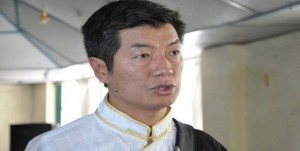Sikyong Dr Lobsang Sangay, the elected Prime Minister of the Tibetan government-in-exile, faced searching questions in an interview with The Diplomat magazine this month. Interviewer Anuradha Sharma probed the leader on key issues ranging from his stance on Tibetan independence to the place of religion in the newly formed Tibetan parliament.
Sharma questioned the leader on the place of His Holiness the Dalai Lama in the fledgling secular government. Sikyong replied “His Holiness still remains the most popular and most revered person among the Tibetans. But because he magnanimously devolved his political authority, he has been deliberate in his approach to ensure that the separation remains.”
Asked if it was possible to lead the administration without being religious, he answered with a definitive “Yes.”
Responding to one newspaper’s accusation of being “alarmingly pro-Beijing”, Sangay defended his support of The Middle-Way approach to greater autonomy in the Tibetan region. “The Middle-Way approach has explicitly been our official policy since the early 70s and Tibetans seek genuine autonomy for Tibetan people. The ‘Memorandum On Genuine Autonomy For The Tibetan People’ was presented to the Chinese government by the previous Khashag [cabinet] in 2008. ‘Genuine autonomy’ essentially means the genuine implementation of autonomy rights enshrined in the Constitution and Autonomy Law of the People’s Republic of China for the minority nationals in both letter and spirit. I have continued working in accordance with the policy that has long been in place.”
Questioned about his earlier support for Rangzen, or full Tibetan independence, during his years at the Tibetan Youth Congress, he explained his change in stance on the issue. “I still have the same passion for Tibet that I had earlier. However, with time I’ve realised that it was wise and realistic on the part of our elders to opt for the Middle Path. It is a win-win situation for all: China can have its sovereignty and territorial integrity and Tibet can have its genuine autonomy.”
The Prime Minister went on to express his regret at the lack of progress in Tibet-Chinese relations over the last four years. “Yes, there has been a stalemate since January 2010, not because of a lack of willingness from the Tibetan side…[China] are on record that they don’t want to talk to me because talking to me amounts to recognising the Tibetan administration. However, for us process is secondary and substance is primary. We have consistently urged a continuation of the dialogue between the envoys of His Holiness the Dalai Lama and his Chinese counterpart”.
Despite difficulties in negotiations with China, Sangay remains hopeful that Tibet will return to the hands of its native people. “Fulfilling their dream is the sole purpose of my life. It is the quest for my own identity and dignity. Someday soon we shall have it.”
To read Prime Minister Sangay’s take on other important issues facing the Tibetan community, you can read the full interview on The Diplomat’s webite:
http://tibet.net/2014/04/08/the-diplomat-speaks-with-the-prime-minister-of-tibetans-in-exile/





 Print
Print Email
Email